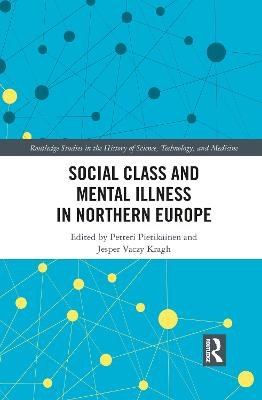
Social Class and Mental Illness in Northern Europe
Routledge (Verlag)
978-1-032-08814-3 (ISBN)
Petteri Pietikäinen is Professor of the History of Science and Ideas at the University of Oulu, Finland Jesper Vaczy Kragh is principle investigator at Psychiatry Region Zealand and a Fellow at CoRe, the University of Copenhagen, Denmark
1 .Introduction (Petteri Pietikainen and Jesper Vaczy Kragh) Part One: Psychiatry, Mental Hospitals and Social Class 2. Class and mental health in post-war Britain (Vicky Long) 3. Pity the poor patient: Small farmers, rural labourers and industrial workers in a mental hospital in Northern Finland, 1925-1970 (Petteri Pietikainen) 4. Different background, different cure? How the patients’ socioeconomic status affected Finnish institutional psychiatry from the 1930s to the 1960s (Anu Rissanen) 5. After patient murder. Asylum psychiatry in the four German occupation zones, 1945-1955 (Maike Rotzoll) 6. Radical reformist psychiatry and the class awareness in Finland in the 1960s and 1970s (Mikko Myllykangas and Katariina Parhi) Part Two: Minorities, Deviants and Psychopaths 7. The Romani minority in Norwegian forensic hospitals, 1895-1940 (Øyvind Thomassen) 8. Femininity and social class in forensic psychiatric assessments in Norway, 1938-1969 (Maria Antonie Sæther) 9. Social class and drug addiction in European psychiatry, 1860-1955 (Jesper Vaczy Kragh) 10. Psychopaths, ‘querulants’ and class in 1930s Sweden: On controversial diagnoses, money, norms and networks (Annika Berg) Part Three: Social Class and Children: War, Nervousness and Hyperactivity 11. ‘Nervous children’ - medical notions of degeneration, mental health and social class in Denmark and England, ca 1900-1945 (Jennie Sejr Junghans) 12. Children changing places. Encountering the ‘war child’ in post-war Finland (Tuomas Laine-Frigren) 13. Challenging the biomedical narrative of ADHD: Social class, race, and hyperactivity in the US and the UK, ca. 1950-2010 (Marie Reinholdt)
| Erscheinungsdatum | 01.07.2021 |
|---|---|
| Reihe/Serie | Routledge Studies in the History of Science, Technology and Medicine |
| Verlagsort | London |
| Sprache | englisch |
| Maße | 156 x 234 mm |
| Gewicht | 326 g |
| Themenwelt | Sachbuch/Ratgeber ► Gesundheit / Leben / Psychologie |
| Geschichte ► Teilgebiete der Geschichte ► Kulturgeschichte | |
| Geschichte ► Teilgebiete der Geschichte ► Sozialgeschichte | |
| Studium ► Querschnittsbereiche ► Geschichte / Ethik der Medizin | |
| Studium ► Querschnittsbereiche ► Prävention / Gesundheitsförderung | |
| Sozialwissenschaften ► Soziologie ► Makrosoziologie | |
| ISBN-10 | 1-032-08814-1 / 1032088141 |
| ISBN-13 | 978-1-032-08814-3 / 9781032088143 |
| Zustand | Neuware |
| Informationen gemäß Produktsicherheitsverordnung (GPSR) | |
| Haben Sie eine Frage zum Produkt? |
aus dem Bereich


